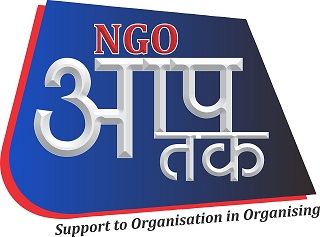We are the best Ngo Registration Consultant In Begusarai
Ngo Aap Tak a leading Ngo registration consultant in Begusarai serves as a link between non-governmental organizations (NGOs) functioning in various parts of Begusarai, Bihar, and donor organizations. Project identification, planning, and implementation are all areas in which we support nonprofit organizations. Sustainability and fundraising are essential considerations. Our proposals are formulated after extensive research, a thorough examination of the client’s range of activities, in-depth knowledge of the various financial assistance options available, and a solid network of support agencies that have been developed through a long and sincere association with them.
To provide proper support to our valued clients throughout the country, we have assembled a diverse team of professionals at crystal vision. An adequate office and an extensive library of support documentation are available to assist these professionals in their work. Ngo Aap Tak Consultancy is dedicated to meeting the deadlines set by our clients and doing it professionally. Ngo Aap Tak has demonstrated expertise in various areas, ranging from new NGO registration to management, fundraising, and grant proposal writing.
Ngo Aap TakConsultation has offered documentation, registration, and management consultancy services to Begusarai, Bihar’s nonprofit, non-governmental organizations (NGOs). The company was founded by a group of well-experienced professional consultants from the social service industry. NGO Consultancy Services are provided by Non-Governmental Organizations (NGOs), Nonprofit Organisations (NPOs), including Societies, Trusts, Charity Organizations, Social Service Organizations, Nonprofit Section 8 Companies, and other types of Social Service Voluntary Organizations engaged in social work across Begusarai, Bihar through Social Welfare Schemes, Projects, Programmes, and Activities, and different kinds of Social Service Voluntary Organizations.
Several types of NGO consulting services are available, including registering a nonprofit organization, assisting nonprofit organizations with funding, assisting nonprofit organizations with grant writing, developing nonprofit organization funding projects for grant approval, documenting nonprofit organization management, and project implementation. According to the Foreign Contribution Regulation Act, Aap Tak provides Documentation Consultancy Services to obtain FCRA Registration. NGO C stands for Non-Governmental Organization.
Ngo Registration Consultant In Begusarai, Bihar, Ngo Registration Procedure In Begusarai, Bihar, Ngo Consultancy In Begusarai, Bihar, Documents Required for Ngo Registration In Begusarai, Bihar, Ngo Registration Office In Begusarai, Bihar, Ngo Registration Online Form In Begusarai, Bihar, New Ngo Registration In Begusarai, Bihar
NGO Consultancy Services in Begusarai, Bihar
A non-governmental organization (NGO) is a nonprofit organization not affiliated with any government, national or worldwide.
Contributions usually sponsor them; however, community members manage others entirely and do not receive formal financing. Non-governmental organizations (NGOs) are a broad set of organizations that participate in various initiatives and assume multiple forms in different country regions. Some may be designated as charity organizations, while others may be eligible for a tax deduction to acknowledge social goals. Others might be shills for political, spiritual, or other causes.
Non-governmental organizations (NGOs) are complex to describe, and the phrase isn’t usually applied consistently. In certain nations, the word NGO refers to an organization that would be referred to as an NPO (nonprofit organization) in another nation, and conversely. These organizations have in common that they are all nonprofit organizations, which indicates short-term financial goals do not constrain them. As a result, organizations can focus on challenges for extended periods, such as environmental issues, disease control, a global prohibition on explosives, etc. According to public polls, NGOs have a high level of public confidence, making them a good — but not usually comprehensive — substitute for society’s and consumers’ issues.
Ngo Registration In Begusarai, Bihar
In Begusarai, Bihar, a Non-Governmental Organization (NGO) or a Nonprofit Organization (NPO) can be incorporated through numerous registration procedures such as a Society, a Company, a Trust, or any other valid establishment, but the designation of the registered entity is of the same purpose and equally acknowledged as an NGO (Non-Governmental Organization/Nonprofit Organization). The registration procedure for a nonprofit organization depends on whether it is formed under the Begusarai, Bihar Trust Act, the Society Registration Act, the Companies Registration Act, or just about any act/law; however, the registered organization has the same status as a nonprofit. There is no distinction in the standing of an NGO in terms of receiving funds from Central/State Government Departments/ Ministries, Foreign funding bodies, Begusarai, Bihar funding groups, corporations for CSR, individuals, or other support agencies.
Some various criteria and regulations apply to all voluntary organization registrations. For anyone wishing to register an NGO, the following conditions apply depending on the type of NGO:
1. Any Social Organization must have more than one participant to be registered. Representatives/Members/Participants might be two or more, depending on the sort of registration permissible under any of the abovementioned Acts.
2. Each participant’s Identification Proof (ID Proof) is necessary for any procedure to demonstrate and authenticate that the individuals with the supplied identification as indicated in the ID proof exist on the Governmental record. Any government-issued and registered identification card (including address), including the Aadhar Card (UID), Driver’s License, Voter ID Card, can be used as valid proof of identity. As ID, participants/representatives must have a passport or another government ID card with their residence information and address proof. Because the address is not included on the PAN card, it cannot be used as identification for registration.
3. Passport-size photographs are necessary. Depending on the registration category, there might be a need for two or three pictures per member/participant.
4. Legitimate ownership or authority proof of the office’s address where the NGO will be registered. The address must be legitimate and meet the requirements of the relevant registrar and the various divisions of the registration territory. Specific regulations exist in the Registration office, but it is occasionally up to only certain authorities and Registrars to impose their norms outside of the legal limitations. The office address determines the jurisdiction, and the registration can be completed in the registrar’s designated region. It can be incorporated as a Society, Corporation, Trust, or any other type of organization, but the territory must adhere to the established boundaries and laws.
5. For the registration of the NGO, a Memorandum or Constitution (Samvidhan) or Articles of Association or Trust Deed is necessary in accordance with the kind of NGO. The memorandum form can vary depending on the registration Act nature, such as Articles of Association Memorandum or Trust Deed. Still, it must be submitted by the members/representatives/participants at registering. In case of the Absence of the Association’s Memorandum, Constitution, Trust Deed, or Articles, Registration is not feasible since it is fundamental and is for documental confirmation of the Non-Governmental Organization’s presence. The memorandum is there to recognize an entity as a registered non-governmental organization. It serves as legal documentation of the organization’s existence. The registration certificate is provided with the Memorandum/ Articles of Association/ Constitution/ Trust Deed when the NGO is registered. There are several sorts of registration certificates. The Registration Certificate for a Trust is published on the back cover of the Trust Deed, while the Registrars issue various Registration Certificates for societies and companies.
6. All types of Memorandums, Articles of Association, Constitutions, and Trust Deeds should include the associated rules, guidelines, statutes, and provisions of the concerned notifications or ordinance and laws of the registration type of procedure. The included regulations and bylaws are one component of the memorandum that describes, convey, clarify, demonstrate, concise, guide, acknowledge, and authenticate the functioning of the members/participants, their judgments, the way of course in which they work, administrative committees of the participants/members/representatives, and the range in which they work, bylaws enforced to the organization and its members/representative as duties and powers, and the organization was permitted to create bank accounts, to enroll the organization with the Internal Revenue Service and other government agencies for various sorts of registrations, and to make members available to current and new members, the tenancy of members/executives/bodies, duration of the organization’s registration period, and a slew of additional bylaws, norms, guidelines, and clauses.
As per rules and regulations, clauses, and sub-clauses, the organization can be recognized and authorized as a registered and authorized nonprofit organization by the relevant authorities (NGO). The activity area can be established and indicated in the NGO’s Memorandum’s provisions and regulations. The regions of function can vary depending on the kind of registration, the location of registration, and specific types of processes: the engagement of members from various areas is dependent on the type of registration, such as a Society, a Trust, or a Nonprofit Corporation.
7. The Memorandum Articles of Association / Constitution / Trust Deed also includes the Aims and Purpose. The memorandum’s purposes determine the organization’s vision and objectives and the territories, segments, issues, and themes it must focus on. It may function on any of these, one at a time or all at once. Along with the Memorandum’s Aims and Purpose, the regions of operation might be indicated and incorporated in the provisions. After registration, the Aims and Objectives can be added or removed, but the varied methods are dependent on the various types of registration Acts and regulations. 8. The Founder’s signature is essential. Some registrars also request other participants’ signatures and pictures in certain places, municipalities, jurisdictions, and states in various types of registration procedures. According to the Trust Act, a charitable trust is a nonprofit organization with multiple requirements regarding physical appearance, consent, and/or the presentation of members’ photographs. In certain states and jurisdictions, all members must be present at the time of registration, whereas in others, attendance is not necessary for all Trust and Society certifications.
Types Of Ngo’s in Begusarai, Bihar
Environmental, education, spiritual, socioeconomic, legal-aid, and social justice work are just a few of the tasks carried out by NGOs. NGOs encourage social or governmental change on a bigger scale and play an important role in societal awareness and development, community improvement, and citizen involvement. However, if a person wants to build a group with members, intentions, administration, plans, and funds must be managed well.
Due procedures and regulations must be followed to register and manage NGOs in the below-mentioned kinds. There are three Kinds of NGOs:
- A Trust under Indian Trusts Act, 1882;
- A Society under Societies Registration Act, 1860;
- A Section 8 Company under Companies Act, 2013;
TRUST: Trust, more frequently known as Charitable trust, is one of the methods an NGO can be registered. The “trustor” or “settlor” creates a legal entity by transferring resources to the second party, the “trustee,” for the welfare of the third party, the “beneficiary.” Trusts are established to assist and nurture the most vulnerable members of society. Any group of people can form a trust, and no special rules govern public trusts in Begusarai, Bihar; however, certain governments have regulations and statutes.
SOCIETY: A society is an entity formed by a collection of people who are committed to fostering education, crafts, culture, social welfare, and valuable knowledge. Furthermore, organizations contribute to creating military orphan funds and the upkeep of public museums and libraries.
The Societies Registration Act of 1860 governs societies. To be qualified for tax exemption, they should be registered with the Registrar of Societies in their particular state. COMPANY (under Section 8): A Section 8 corporation resembles a trust or a society. Section 8 companies are formed to encourage the arts, science, trade, sports, communal welfare, religion, philanthropy, and protection of the environment, among other things. They are an organization for charitable/spiritual/welfare purposes registered under the Companies Act of 2013.
Documents Required For Ngo Registration In Begusarai, Bihar
The given Documents are required for the registration of an NGO: –
To Register a Trust
- Aims and Objectives of Trust.
- Details of the Trustee and the settlor like address proof, occupation certification document, and Government issued Identity Cards (Self-attested copy along with Originals).
- Trust Deed with Correct Stamp Valuation
- Colored passport-sized Pictures of both parties.
- PAN Cards of Trustee and settlor both.
Registration of Societies: The following documents are necessary for a society registration:-
- The proposed name of the society.
- Address Proof of the location.
- Government-issued Identity Cards of all members.
- Two sets of xerox of the society’s Memorandum of Association and By-laws.
Registration of Section 8 Corporations: The following documents are necessary for company registration:-
- Xerox of both id proof and address proof (PAN Card mandatory).
- Respective Director’s consent in the way of Form DIR-2 and id proofs and complete address.
- The latest water bills or electricity bills are not more than two months.
- Proof of address for the registered office.
- If the New registered office is rented, no objection certificate from the actual owner is necessary.
- Affidavit in support of payments.
- Declaration by Professionals (INC-14)
- Promoters’ declaration is duly notarized by way of INC-15 on the stamp paper.
- Annual Income Estimation.
- Articles of Association and Memorandum of Association.
- Complete particulars of the promoters and members of the prospective company’s board of directors.

New Ngo Registration Procedure In Begusarai, Bihar
The legal way of registering NGOs in Begusarai, Bihar under the specified categories and methodologies can be established and followed by the various pre-registration requirements and bylaws per the Non-Governmental Organization/Nonprofit Organization (NGO/NPO). The registration of a new Non-Governmental Organization depends on the purpose and primary objective of the NGO to determine the kind of NGO registration required. For instance, it can be incorporated as a Trust, Society, Nonprofit Corporation, or any other form of NGO that comes under the Trust Act, Society Act, Company Act, or any other Act or statute. The procedures for registering Nonprofit Organizations vary depending on the kind of establishment: trust, society, or nonprofit corporation. An applicant must follow numerous rules and procedures established in the appropriate Act depending on the type of NGO Registration (Trusts, Societies, and Section 8 businesses).
NGO registration procedure as a Trust
The steps for registering a trust are shown below.
- Choose a Name That Is Appropriate: while registering a trust, founders/members/representatives have to choose a suitable unique title for the faith, which must not be on the Emblems and Names Act, 1950’s limited list of names.
- Trust Deed Drafting: The Trust deed must be designed with the objective of Trust registration.
- A trust deed is a document that incorporates all of the necessary relevant data for registration, and it must be presented to the registrar at the moment of registration.
- Choosing the Trust’s Settlers and Trustees: The subsequent step is to select the Trust’s settlor and Trustees. There is no specific provision for the upper limit of settlers/authors, but a Trust must have a least two trustees.
- Putting together a Memorandum of Association: The Memorandum of Association is essential for Trust registration since it serves as the Trust’s foundation.
- Payment of the Required Fees: The following step is to deposit the Trust registration fees.
- Obtaining a Copy of the Trust Deed: After submitting the requisite documentation, the applicant can receive the certified hardcopy of the Trust Deed within one week.
- The Trust Deed Is Filed With The Registrar: the applicant must attach a certified version of the Trust Deed with the registration application to the local registrar.
- Obtain the Certificate of Registration: After sending the Trust Deed to the registrar, the registrar provides the original registered version of the trust deed to the applicant within seven days, together with the registration certificate.
NGO Registration Procedure as a Section 8 Company
An applicant/representative must complete the procedure mentioned below to register an NGO under Section 8 as a Company: –
Step 1: Submit an application for DSC: The essential and fundamental step is to apply for a Digital Signature Certification.
Step 2: Using SPICE+, make a name reservation: The method for purposing a name for accompanying under Section 8 is almost the same as of any other business. To file a Name proposal, one must fill out the ‘SPICe+’ Form. The SPICE+ form is required for the approval of the company’s name. The company’s name under Section 8 must be thought will innovative and must be secured. The name must contain the terms, such as:-
- Chambers,
- Federation,
- Foundation,
- Forum,
- Association,
- Confederation,
- Council, etc.
STEP 3-: Filling up and submitting the SPICE+ Part A Form: The applicant must complete the SPICE+ Part A form for name finalization. (The SPICE+ form also includes the DIN Application.)
Filing SPICE+ Part B: Following the submission of SPICE+ Part A, the next step is to obtain SPICE+ Part B in PDF version for incorporation purposes to fill out the corresponding forms (SPICe+AoA, SPICe+MoA, AGILE-PRO, INC-9, and URC-1) and attach the “DSC.”
Step 4: Prepare the MOA and AOA: After actively submitting the name registration form, one has to offer the MOA and AOA on the requisite Website. These are both internet-based applications.
An applicant must fill in complete and legitimate data in the MOA/ AOA according to the criteria of Schedule I. Attaching the Digital Signature Certificates of all members’ are a must.
Step 5: Entering information in an AGILE PRO: The next step is to complete the AGILE PRO form with all of the asked information. This form comes with the following features:
- EPFO/ESIC is a legal requirement.
- GST (optional)
- New Bank Account
Step 6: Complete the INC-9 form with the necessary information. The member/representative or first director’s declaration is included in form INC-9.
Step 7: Submitting Forms to the MCA: After filling out all of the required information in the abovementioned forms, the applicant must scan and hit the submit icon. The applicant must send the application and other structures after completion and ensure no required particular is wrong or left, and the DSC should be linked to the appropriate form.
Step 8: Conduct a pre-scrutiny assessment and pay the required fees: The preview stage is to conduct a final application examination. After thoroughly checking and assessing the forms and particulars, the applicant must press the last submit option. In addition, the applicant corporation must pay the requisite fee for registration and retain the payment receipt for future references.
Step 9: Obtaining a Certificate of Intent (COI) from the Registrar: If the Registrar is so satisfied that particulars and forms are correct and legitimate, they will provide a Certificate of Incorporation with the NGO to be registered.
NGO Registration Procedure as a Society
For an NGO to be registered as a Society, the co-founders/members must think of a unique and distinctive name and prepare the Society’s Memorandum.
Choose a Name for the Society: While finalizing the new name for the NGO, consider that the new character must be relatable to society’s objective and un-identical, as required by the Societies Act of 1860. Furthermore, the applicant’s proposed name must not hint (expressly or implied) at any relation with the sponsorship of the Government of Begusarai, Bihar, or any State Government. It must be exempted from the restrictions of the Emblem and Names Act 1950.
Prepare Society’s Memorandum: An applicant must draft a good and informative Memorandum of Society before registering for the society. The memorandum must reflect the management and intention of the Founder/members.
Each of the founder members must approve and sign the Memorandum of the NGO and the Regulations and bylaws of the Society, which must be attested by.
- An Oath Commissioner,
- Notary Public,
- Gazetted Officer,
- Advocate,
- Chartered Accountant, or
- Magistrate of 1st Class.
Prepare the necessary documents: An applicant must provide the particulars mentioned below for society registration. The documents must be signed in their entirety.
- The proposed name of the society.
- Address Proof of the location.
- Government-issued Identity Cards of all members.
- 2 set of Xerox of the society’s Memorandum of Association and By-laws.
Application Submission: The approved Memorandum and Rules and Regulations must be filed with the concerned registrar within the local limits of the NGO’s Office, together with the asked fee.
Obtain Society Accreditation: When all of the information and certifications are provided, and the registrar is satisfied with the application for registration, they will certify that the society is incorporated with the issuance of the Certificate.
New Ngo Registration Forms Online
Forms required for online NGO registration in Begusarai, Bihar are mentioned below:
Form INC 1: Name registration of NGO.
Form INC 12: Form to acquire a license to run an NGO.
Form INC 13: Memorandum of Association.
Form INC-15: is a declaration by each subscriber to the memorandum.
Form INC 7: Application for Incorporation of the NGO.
Condition INC 22: Details of the Registered Address. Form DIR 12: To appoint directors of the NGO.
New Ngo Name Registration
A proposal must be made in line with the authorized procedure using the required proforma to get the New NGO’s approval. The Registrar of Companies [“RoC”] must approve the name by presenting a proposal in e-Form INC 1. The name is effective for 60 days after the authorities have authorized it. The applicant for the accessibility of name application shall be the member/representative/signatory to the Memorandum and Articles of Association. All co-founders or members must approve a specific Unique new name for the NGO in writing at the time of registration. The new NGO name may require interpreting the society’s motto and objectives.
Following approval of the name, the NGO must submit a request for registration with the District Registrar in whose territory the NGO’s official office is located. If an NGO is registered under a name that, in the perception of the registrar, is similar to or excessively resembles the title of any other NGO that has earlier been certified or incorporated, he may, by order can direct such NGO to rename and modify its memorandum within the given time limit.
After the District Registrar has accepted the newly proposed name in the way provided, a Society may alter its name. Once the name has been approved, the individual designated by the society must make an application for change/modification of title to the District Registrar, with the specified fee and a duplicate of the special resolution passed.
The District Registrar should record the modification in the society’s name by inserting the new title in the record to replace the old one and issuing a new certificate of registration that includes both the old and new characters and any required changes. Only when such a certificate is issued is the change of name effective.
Ngo Registration Office In Begusarai, Bihar
Every New NGO must have a registered office, which can be found anywhere in the territory in which it is incorporated, and whereby all correspondence and notices must be sent. The NGO must notify the District Registrar’s office of any change in its address within thirty days of its establishment. The registrar will mark the modification in the certification of registration and the database of organizations.
Any modification in an NGO’s registered office location beyond the district in which it is incorporated must be reported to both District Registrars. An NGO’s registered office can be changed at any time. According to the Companies (Incorporation) Rules 2014, it must file Form INC-22 with the registrar within the territory of the location of its registered office. The new NGO Office Registration Procedure is as follows:-
- Relocating within a city, town, or village’s boundaries
- A Board Resolution is required to acquire the permission.
- Once you have the Board Resolution, you must file e-Form INC – 22 within 15 days of the resolution’s approval.
- Inside the same RoC and state, change occurs outside the local bounds of a city, town, or hamlet.
- It is necessary to acquire Board Resolution approval.
- Within 15 days of receiving the Board Resolution, a Special Resolution must be enacted using Form MGT – 14.
- The request for notification of modification/re-allocation of the registered office of the NGO must be filed in the way of form INC – 22 within 30 days after the passing of the Special Resolution.
Role of Ngo Consultancy In Begusarai, Bihar
Non-Governmental Organizations (NGOs) worldwide turn to NGO consulting for guidance, expertise, and remedies. Consultancy offerings include assessment methods, legal advice, project, and organizational structure assistance. If the NGOs are capable or willing to subscribe to the facilities, they are available to domestic and international NGOs. Each NGO consultancy is led and managed by persons who have worked in the nonprofit and worldwide development sectors. Non-governmental organizations (NGOs) are formed for several purposes. These initiatives might be socioeconomic or governmental, and they can be long-term or relatively short. They are somewhere while being government agencies and being self-sufficient, profit-driven corporations. As a result, most NGOs are nonprofit organizations supported by state or inter-governmental financing.
Organizational guidance and support are primarily directed at new NGOs, but they can also benefit existing NGOs looking to improve their efficiency. Consultancy Services usually focus on the framework first, ensuring that the NGO runs smoothly, has all of the essential people and processes in place, and accomplishes its goals. The latter is provided by an NGO consulting that assists the organization in focusing on its purpose and vision. Quality improvement, developing strategies to manage, and organizational culture growth are other services provided by consultancies. Two areas of the NGO are targeted for training. Senior leadership is trained in organizing and operating companies, while employees are instructed to accomplish their duties.
An NGO consultancy’s economic guidance concentrates on issues like fundraising and accountancy. As an outcome, the consulting assists nonprofits with funding opportunities, tax deductions, and account administration. They also provide legal assistance to non-governmental organizations (NGOs) both at home and abroad. Whether persons or entities, consultants can help organizations boast, grow, or review certain aspects of their activity by providing momentary skills, expertise, and competence. Most nations globally have experts that can assist your NGO in every element of administration, governance, and quality management. From grant writing and volunteer supervision to legal counsel and government policy, you’ll almost certainly be able to locate a consultant in your region who has the skills and expertise you need.
The planning, implementation, and evaluation of a particular event or initiative in the field are all covered under program project management. The term “planning” refers to everything from defining a project to managing operations. The NGO consultancy often monitors and assesses an ongoing project as part of the planning process. When evaluating a project, they also consider community engagement, effect, and public relations. For More Details Contact Us





